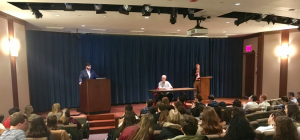By Jasmin Boyce

(Jasmin Boyce/The Fordham Ram)
College Democrats and College Republicans took the stage of Flom Auditorium for Fordham Political Review’s semi-annual debate. Representatives went toe-to-toe on the nation’s opioid epidemic, President Donald Trump’s decision to move the U.S. embassy in Israel to Jerusalem, hurricane relief in Puerto Rico and the issue of gun control in the United States.
Party representatives were each allotted a two-minute introduction followed by two series of ninety -second rebuttals. After this, the floor was opened to the audience for a question and answer segment lasting around eight minutes per topic. Each representative presented a closing statement lasting one minute.
Louis Norred, FCRH ’21, spoke on the opioid crisis in the U.S. for the College Republicans. He proposed a strong presence of law enforcement would help decrease the lives lost to the addictive drug each year.
“Through a well-funded and active drug enforcement agency, our nation seeks to resolve this pressing social problem.” stated Norred.
Collin Bonnell, FCRH ’21, of the College Democrats, urged against this in his rebuttal. Bonnell said past presidents, like Nixon and Reagan, have declared wars on drugs that have not yielded positive results.
“More criminalization is never the solution to a problem like this,” said Bonnell. “The only way that we can help this is through the gradual decriminalization of drugs.”
Declan Murphy, FCRH ’18, argued for the College Democrats against the Trump administration’s decision to move the United States Embassy in the State of Israel from Tel Aviv to Jerusalem. He said there would be no fair peace in a one-state solution, urging the crowd to remember the two-state solution has long been a cornerstone of U.S. Diplomacy.
“Moving the U.S. embassy from Tel Aviv to Jerusalem is an act of provocation on the part of Trump,” said Murphy. “That’s not me speaking, that’s the U.N. General Assembly and the U.S. security council who voted the move was provocative.”
To counter this argument, College Republican Tim Kyle, FCHR ’21, referenced the United Nation’s history with the State of Israel. Kyle said it was a unique relationship compared to other nations.
“Israel is given an exception in the international community by the U.N. in that they’re not allowed to choose their own capital,” said Kyle. “Every country should have the right to choose where they have their government.”
While some of the debate was partisan, both sides agreed the United States should send more relief to Puerto Rico after last year’s devastating hurricane. However, their arguments differed over how far that relief effort should extend.
Samantha Hardy, FCRH ’21, arguing for the Democrats, said Puerto Ricans should receive equitable aid provided to other recent hurricane-ravaged areas, like Texas and Florida, because they are citizens of the United States.
“The response was inadequate and insufficient, as there was a discrepancy between treatment and responsiveness of mainland disasters such as Hurricane Harvey and Hurricane Irma and Island Territories such as Puerto Rico,” said Hardy.
While Ryan Slattery, FCRH ’20, arguing for the Republicans, did not contest the need for greater federal assistance in Puerto Rico, he questioned the legitimacy of the amount of funds necessary for the Puerto Rico Equitable Rebuild Act of 2017, currently being pushed in the Senate.
“I believe that this plan would cause economic ripples throughout the nation, if we are to relieve any debt without means of proper bankruptcy,” said Slattery.
The debate concluded with the topic of gun control. College Democrat Michael Fissinger, FCRH ’21, stated the problem lies in the number of guns present within the country. He called for a revised federal ban on assault rifles and said the government should work to decrease the amount of guns in private possession.
“I propose a comprehensive gun buyback program,” said Fissinger. “Should the federal government not sponsor such an activity, I recommend state and municipal governments take up the issue.”
College Republican Domenic Setaro, FCRH ’20, said there should be greater restrictions when buying weapons, but urged against an all over ban on guns.
“We need stricter background checks four guns, which pay extreme attention to the applicant’s mental health, and we must increase our security in schools and urban areas to further prevent these atrocities from occurring again in the future,” said Setaro.
Rev. Bentley Anderson, S.J., associate chair and associate professor of African and African American Studies, said he moderated the event with a rigid structure to ensure the crowd remained under control. Anderson said the gun control debate was held to the end purposefully because he was concerned it would get out of hand.
“I was very careful on the time,” said Anderson. “In part because I don’t want the students acting like the adults we see on TV when it comes to debating controversial or high-energy charged topics.”
Audience member Alana Murphy, FCRH ’19, said events like this have a positive impact on campus. She said debates helps both sides understand their own argument and the arguments of their opponent in a more open and productive setting.
“I think this was a good experience for everyone to actually kind of be forced to listen to both sides, and to really see both the weakness in your own argument possibly and the strengths of someone else’s argument,” she said.
Correction: A previous version of this article attributed Collin Bonnell, FCRH ’21, as a member of College Republicans. It has been updated to reflect that Bonnell is a member of College Democrats.






































































































































































































